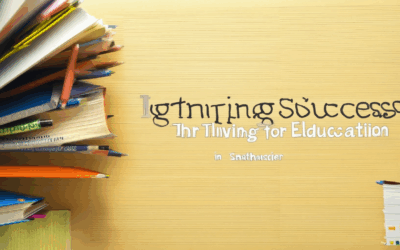Academic growth is a cornerstone of success, shaping minds and futures as students navigate their educational journeys. For many, the path to achieving this growth can feel overwhelming, especially when juggling coursework, extracurricular activities, and personal responsibilities. However, one tool has emerged as a powerful ally in this quest: blogging. A well-crafted academic growth blog can serve as more than just a platform for self-expression; it’s a dynamic resource that fosters critical thinking, enhances writing skills, and even improves time management and organization. By leveraging the power of words, students can unlock new perspectives, refine their arguments, and build confidence in their abilities. Whether you’re exploring complex theories, reflecting on personal experiences, or staying ahead of trends, blogging offers a unique opportunity to grow academically while developing essential life skills. In this article, we’ll delve into how blogging can be a catalyst for your academic growth, uncovering its role in fostering success and equipping you with tools that last a lifetime.
Key Takeaways
- Consistency Builds Discipline: Regular blogging mirrors academic routines, helping students develop necessary habits.
- Targeted Topics Deepen Understanding: Aligning blog topics with coursework or interests leads to in-depth analysis and improved comprehension.
- Feedback Drives Improvement: Sharing posts for critique helps students revise and refine their work based on others’ insights.
- Networking Broadens Perspectives: Collaborating through guest posts or group blogs connects students with diverse viewpoints and opportunities.
- Time Management Skills: Allocating specific times for blogging teaches productivity, using tools to track progress.
- Multimedia Enhances Creativity: Incorporating visuals, audio, or videos makes content more engaging and appealing to different learning styles.
- Cross-Promotion Increases Reach: Sharing blogs on social media or forums expands audience access and engages readers through interactions.
- SEO Boosts Visibility: Keyword research optimizes content for search engines, attracting relevant readers.
- Reflection Improves Strategies: Reviewing content and using analytics helps identify strengths and areas for growth, allowing for adjustments.
- Critical Thinking Sharpens Skills: Formulating arguments and examining ideas through blogging sharpens analytical abilities crucial for academic success.
- Research Reinforces Learning: Sharing findings and insights helps organize complex information, aiding in effective learning and retention.
- Networking Facilitates Collaboration: Engaging with peers and mentors through comments and discussions fosters collaborative learning and mentorship opportunities.
- Recognition in the Community: Well-written blogs can establish visibility, leading to invitations for academic contributions and recognition.
- Personal Branding Opens Doors: Building a thought leadership presence through blogging can lead to academic positions, consulting roles, and speaking engagements.
- Motivation and Accountability: Consistent blogging keeps users engaged and responsible, pushing them to explore new topics and improve skills.
- Writing Skills Development: Regular content creation refines writing abilities, improving clarity and individual voice.
- Intellectual Exchange and Sharing: Publishing thoughts on platforms like Enroll Maven fosters intellectual exchange and builds a personal brand.
- Collaboration and Support: Connecting with like-minded individuals opens doors for joint projects and academic support.
- Exploring Trends and Directions: Engaging with diverse perspectives helps identify emerging trends and research ideas.
- Portfolio Construction: Published blogs serve as a lasting record of skills and expertise, useful for academic and professional applications.
- Stay Informed and Prepared: Following trends via blogs keeps users updated, readying them for future academic challenges.
- Contributing to Discourse: Meaningful participation in broader conversations adds depth to academic contributions and instills a sense of purpose.
How Can Blogging Contribute to Academic Growth?
1. Sharing Expertise and Research Insights
Bloggers in academic fields can share their expertise and research findings, making complex topics accessible to a broader audience. This process not only reinforces understanding but also encourages further exploration and discussion among readers.
2. Fostering Intellectual Discussion
Blogs provide a platform for open dialogue and debate, allowing individuals to engage with diverse perspectives. This intellectual exchange can deepen understanding, challenge assumptions, and inspire new ideas, all of which are crucial for academic growth.
3. Building a Professional Network
By interacting with other bloggers and readers, academics can establish connections that may lead to collaborations, partnerships, or job opportunities. These relationships often span industries and disciplines, broadening professional horizons.
4. Enhancing Personal Development
Reflective blogging helps individuals articulate their thoughts and experiences, aiding in self-awareness and personal growth. This practice can also foster continuous learning by exposing one to new ideas and viewpoints through engaging with various blogs.
5. Improving Critical Thinking Skills
Engaging with differing opinions and analyses on blogs sharpens critical thinking abilities. Readers are forced to evaluate arguments, consider counterpoints, and draw conclusions, all of which are essential skills for academic success.
6. Supporting Career Advancement
A strong blogging presence can establish an individual as an authority in their field, making them more competitive in academia or professional roles. It also provides material for conference presentations, CVs, and grant proposals, showcasing thought leadership and contributions to the field.
7. Encouraging Portfolio Development
Blogs serve as a writing portfolio, demonstrating writing skills, analytical abilities, and subject expertise. This portfolio can be particularly valuable for students, researchers, and professionals seeking to showcase their work.
8. Expanding Knowledge Base
Reading and contributing to blogs related to one’s field exposes individuals to a wealth of resources, trends, and innovations. This exposure accelerates learning and keeps one updated on the latest developments in their area of interest.
Competitor Mention (Example)
While there are many excellent platforms and blogs in the academic space, such as Medium and WordPress , these should be used as tools to enhance your own blogging journey rather than as direct competitors.
By leveraging the power of blogging, individuals can unlock numerous opportunities for personal and professional growth, all while contributing meaningfully to their chosen fields.
Blogging and Academic Growth: A Comprehensive Overview
Blogging plays a pivotal role in fostering academic growth by providing a dynamic platform for learning, reflection, and engagement. Here’s how it contributes to intellectual development:
- Enhances Writing Skills : Regular blogging encourages consistent expression of ideas, improving communication and critical thinking abilities essential for academic success.
- Fosters Critical Thinking : Engaging with diverse perspectives through comments and discussions sharpens analytical skills, preparing students for rigorous academic debates and evaluations.
- Encourages Collaboration : Blog interactions foster a sense of community, promoting collaborative learning and teamwork, skills vital for group projects and classroom discussions.
- Expands Knowledge Base : Accessing varied content on blogs broadens understanding beyond traditional curricula, inspiring curiosity and encouraging exploration of new subjects.
- Builds Networking Opportunities : Connecting with experts and peers via blogs creates mentorship chances and provides access to valuable resources, enhancing academic support systems.
- Supports Reflective Practice : Blogging offers a space for self-assessment, helping students identify strengths and areas for growth, thereby improving study habits and academic performance.
- Develops Real-World Applications : Gaining proficiency in digital platforms through blogging prepares students for the demands of modern academia, where presenting and evaluating information online is commonplace.
- Motivates and Persuades : The process of articulating ideas and receiving feedback can boost confidence and sustain interest in academic challenges, aiding persistence and dedication.
Enroll Maven emphasizes the importance of leveraging such tools for educational advancement, encouraging students to explore blogging as a means to enhance their academic journeys. Visit our platform for additional resources and strategies to maximize learning potential.
What Strategies Can Help Students Achieve Academic Growth Through Blogging?
Blogging offers a unique opportunity for students to enhance their academic growth by developing essential skills and fostering intellectual curiosity. Below are proven strategies that can maximize this potential:
- Consistency is Key : Regularly updating a blog encourages discipline, mirroring the routine needed for academic success. Aim to set a weekly posting schedule to build momentum and habits.
- Choose the Right Topics : Select subjects aligned with coursework or personal interests. Focus on in-depth analysis rather than superficial summaries to demonstrate deeper understanding.
- Engage with Feedback : Share blog posts with peers, teachers, or mentors for constructive criticism. This fosters a habit of revising and refining work based on others’ insights.
- Collaborate and Network : Guest post or contribute to group blogs to connect with like-minded students. This broadens perspectives and exposes students to diverse viewpoints.
- Time Management Mastery : Allocate specific blocks of time for blogging to maintain productivity. Tools like planners or digital calendars can help track progress and deadlines.
- Experiment with Multimedia : Incorporate visuals, audio, or video elements to make content more engaging. This enhances creativity and appeals to different learning styles.
- Cross-Promote Content : Share blog links on social media platforms or school forums to reach a broader audience. Engage readers by responding to comments and feedback.
- Focus on SEO : Conduct keyword research to optimize blog content for search engines. This ensures visibility and attracts readers interested in similar topics.
- Reflect and Iterate : Periodically review blog content to identify strengths and areas for improvement. Use analytics tools to track engagement and adjust strategies accordingly.
By implementing these strategies, students can transform blogging into a powerful tool for academic growth, equipping them with skills that extend far beyond the classroom.
What Strategies Can Help Students Achieve Academic Growth Through Blogging?
Blogging offers a unique opportunity for students to enhance their academic growth by developing essential skills and fostering intellectual curiosity. Below are proven strategies that can maximize this potential:
- Consistency is Key : Regularly updating a blog encourages discipline, mirroring the routine needed for academic success. Aim to set a weekly posting schedule to build momentum and habits.
- Choose the Right Topics : Select subjects aligned with coursework or personal interests. Focus on in-depth analysis rather than superficial summaries to demonstrate deeper understanding.
- Engage with Feedback : Share blog posts with peers, teachers, or mentors for constructive criticism. This fosters a habit of revising and refining work based on others’ insights.
- Collaborate and Network : Guest post or contribute to group blogs to connect with like-minded students. This broadens perspectives and exposes students to diverse viewpoints.
- Time Management Mastery : Allocate specific blocks of time for blogging to maintain productivity. Tools like planners or digital calendars can help track progress and deadlines.
- Experiment with Multimedia : Incorporate visuals, audio, or video elements to make content more engaging. This enhances creativity and appeals to different learning styles.
- Cross-Promote Content : Share blog links on social media platforms or school forums to reach a broader audience. Engage readers by responding to comments and feedback.
- Focus on SEO : Conduct keyword research to optimize blog content for search engines. This ensures visibility and attracts readers interested in similar topics.
- Reflect and Iterate : Periodically review blog content to identify strengths and areas for improvement. Use analytics tools to track engagement and adjust strategies accordingly.
By implementing these strategies, students can transform blogging into a powerful tool for academic growth, equipping them with skills that extend far beyond the classroom.
What is the Impact of Blogging on Academic Growth?
Blogging significantly enhances academic growth by fostering various intellectual and professional development aspects. Here’s a breakdown of its key impacts:
- Critical Thinking and Analysis
Blogging encourages the formulation of well-supported arguments and the critical examination of ideas. Regularly publishing thoughts forces individuals to articulate their perspectives clearly and backed by evidence, thereby sharpening analytical skills essential for academic success. - Research and Knowledge Sharing
Academics often engage in extensive research, and blogging provides a platform to share findings and insights. This process not only reinforces understanding but also helps in organizing complex information, which is crucial for effective learning and retention. - Networking and Collaboration
Blogging creates opportunities for connecting with peers, mentors, and experts in the field. Engaging with comments and discussions fosters collaborative learning and can lead to valuable collaborations or mentorship opportunities, enriching the academic journey. - Visibility and Recognition
A well-written blog can increase visibility in the academic community. Established bloggers often gain recognition for their expertise, leading to invitations for contributions in academic journals, conferences, and other platforms. - Personal Branding and Identity
Building a personal brand through blogging helps individuals establish themselves as thought leaders. This can open doors for academic positions, consulting roles, and speaking engagements, as others rely on your expertise and perspective. - Motivation and Accountability
Consistent blogging keeps individuals motivated and accountable. Publishing regular content creates a sense of responsibility, pushing users to stay updated on trends, explore new topics, and continuously improve their skills.
By leveraging the power of blogging, individuals can elevate their academic profiles, foster meaningful connections, and contribute meaningfully to their fields. It serves as a dynamic tool for personal and professional growth, aligning perfectly with the mission of Enroll Maven to empower educational success. Explore our resources today to unlock the full potential of blogging for your academic journey.
Opportunities Blogging Offers for Academic Growth
Blogging presents numerous opportunities for academic growth, serving as a dynamic platform to enhance skills, share insights, and connect with like-minded individuals. Here are some key benefits:
- Enhance Writing Skills: Regular blogging requires consistent content creation, helping users refine their writing abilities, improve clarity, and develop a unique voice.
- Share Insights and Ideas: Platforms like Enroll Maven allow users to publish thoughts, research findings, and opinions, fostering intellectual exchange and building a personal brand.
- Network and Collaborate: Blogging connects users with others who share similar interests, opening doors for collaboration, mentorship, and academic support.
- Explore Research Topics: By engaging with diverse perspectives, bloggers can identify emerging trends, gain inspiration, and explore potential research directions.
- Build a Portfolio: Published blogs serve as a portfolio, showcasing writing capabilities, subject expertise, and thought leadership, which can be invaluable for academic and professional pursuits.
- Stay Updated and Informed: Reading and responding to comments on popular education blogs keeps users ahead of academic trends, enabling better preparedness for future challenges.
- Contribute to Public Discourse: Blogging allows users to contribute meaningfully to broader conversations, adding depth to their academic contributions and fostering a sense of purpose.
Enroll Maven encourages students, educators, and professionals to leverage blogging as a powerful tool for personal and professional development. By joining our community, you can unlock these opportunities and take your academic journey to the next level.
For more resources and tips on academic growth, visit Enroll Maven today!









0 Comments